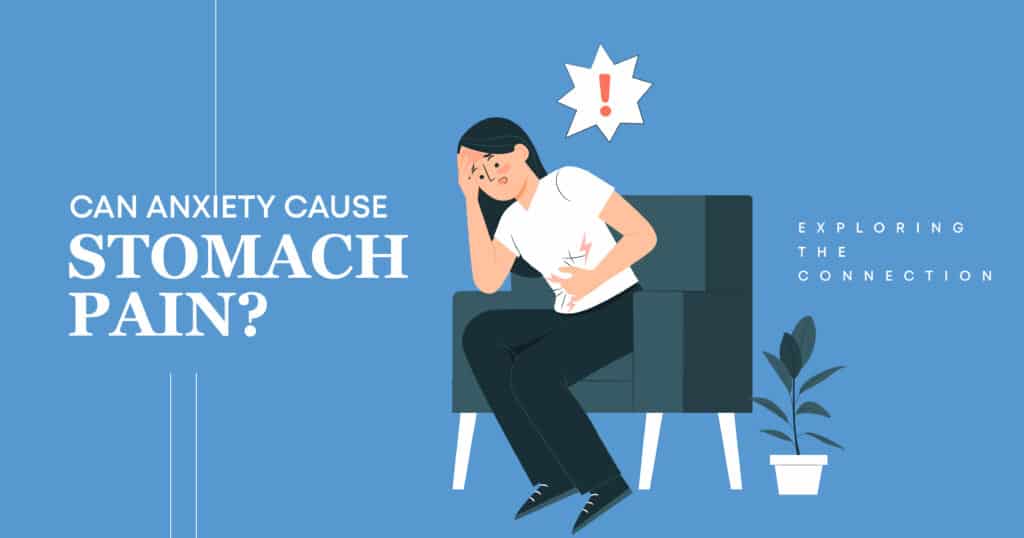Ever had butterflies in your stomach before a big presentation or a spontaneous feeling of sickness in the pit of your stomach when you are under stress? It is not all in your head, and you are not alone. Most individuals are quite amazed to realize the extent to which their gut feelings are connected to their emotional states. So, can anxiety cause stomach pain? Absolutely.
There is a close connection between digestion and emotional stress, and it is no wonder you get a stomach cramp, bloating, or nausea when you are anxious about a stressful situation. The studies even mention that over 40 percent of irritable bowel syndrome (IBS) patients report feeling very anxious, which again brings us to the conclusion that mental health and gut issues are interrelated. Whether it is the occasional case of the anxious stomach and jitters or a long-lasting uncomfortable feeling, it is essential to know how the two are connected.
In this blog, we will learn the reason why that can happen, how stomach ache can be caused by psychological stress, and what are some of the things you can do to make the pain go away.
What Is Anxiety and How Does It Affect the Body?
Anxiety is not only “worrying too much.” It is a full-body experience. Whether you’re worried about an exam or overwhelmed at work, or worried about the future, anxiety can manifest in ways that extend well beyond your brain. Your heart races, your muscles are ready, your palms get sweaty, and yes, your stomach can start tightening into knots. It’s your body’s way of reacting to what it perceives as a threat, even if that threat is only an impending deadline or forced conversation.
When you become anxious, your body moves into fight or flight mode. As may be expected, your stress hormones, like cortisol and adrenaline, surge to prepare you either to fight the threat or flee from it. This response might be good when you’re trying to escape from a lion, but at 2 AM, you may end up with headaches, neck or back pain, fatigue, stress, and stomachaches.
The Relationship Between Anxiety and Digestive Health
Ever wonder why your stomach churns when you’re nervous? Your gut and your brain are in constant communication. This cross-talk is often referred to as the gut-brain axis, which means that what affects your mind may also impact your feelings of fullness and satisfaction from eating.
So, whether it’s sweaty palms, a dry mouth, or a roiling stomach, it’s a minor case of nerves or full-blown anxiety-induced stomach cramps, the digestive system is affected. Knowing this connection can help you more effectively care for your mental and physical health. The following is a breakdown of how anxiety can affect different aspects of digestion:
| Anxiety Effect | Digestive Response |
| Increased stress hormones | Stomach pain, cramps, or bloating |
| Muscle tension in the abdomen | Discomfort, tightness, or sharp aches |
| Altered gut motility | Diarrhea or constipation |
| Heightened gut sensitivity | Increased perception of pain or fullness |
| Reduced digestive enzyme production | Nausea, indigestion, or poor nutrient absorption |
| Disrupted gut microbiome balance | Inflammation, gas, and ongoing digestive issues |
| Focused mental stress | Worsened IBS or chronic digestive disorders |
Symptoms of Anxiety-Induced Stomach Pain
Anxiety does not take place in the mind only – it is also experienced in the stomach. This may affect your digestive system so that when you become stressed, the result is not only unpleasant but also very painful. Common conditions of anxiety-related stomach issues are:
- Nausea or queasiness, especially during or after stressful events
- Bloating or feeling overly full, even after small meals
- Butterflies or fluttering sensations in the stomach
- Sudden urge to use the bathroom (diarrhea or loose stools)
- Constipation or irregular bowel movements
- Loss of appetite or feeling full too quickly
- Gurgling or churning stomach noises
- Acid reflux or indigestion
- Tightness or knots in the lower abdomen
Common Triggers of Anxiety That Impact the Gut
Anxiety doesn’t just show up; it usually has situations, ideas, or routines that trigger it. When those instances occur, the brain may transmit a signal, and your stomach generally experiences the effect. The body is extremely responsive to emotional change, as shown by the stomach. If you are able to detect anxiety triggers, you can improve how you manage your brain and your gut. Here are some anxiety triggers that can lead to stress and abdominal discomfort:

- Job-related stress, deadlines, or job loss
- Financial stress or unexpected financial costs
- Relationship problems or emotional disruption
- Changes in your circumstances (moving to a different location, divorcing, beginning a new job)
- Social or performance situations and/or fear of being judged
- Perfectionism and fear of failure
- Not getting good sleep or not sleeping
- Excessive caffeine or sugar consumption
- Negative thinking or thinking the worst
- Health anxiety or fearing you might get sick
- Unresolved trauma or emotional disturbance
How to Differentiate Between Anxiety-Induced and Other Causes of Stomach Pain
The stomach may hurt due to many reasons, which might include food intolerance, infections, and chronic illness. However, in case of anxiety, the heavy feeling often follows the emotional stress, or it can be experienced during moments of agitation. This is a skill that is really necessary to learn in order to get the proper treatment for your pain, and also to learn when to ignore it and reduce your overall stress.
Here is a table comparing general traits between anxiety-induced stomach pain and other digestive disorders:
| Feature | Anxiety-Induced Stomach Pain | Other Medical Causes |
| Onset | Often sudden, during, or after stress or worry | Can be gradual or tied to eating, illness, or infection |
| Duration | Short bursts may come and go with stress levels | Often persistent, may worsen over time |
| Associated symptoms | Rapid heartbeat, sweating, nausea, shallow breathing | Fever, vomiting, diarrhea, or localized pain |
| Triggers | Emotional stress, anxiety, and panic attacks | Food, infection, chronic GI disorders (like IBS, ulcers) |
| Relief methods | Improves with deep breathing, mindfulness, and calming | May require medication, dietary changes, or treatment |
| Pain location | Generalized or shifting discomfort | Specific and consistent (e.g., lower right side in appendicitis) |
Seek Professional Help for Anxiety at Hillside Horizon for Teens
It’s a common refrain that modifications to our lifestyle and engaging in meditative activities can help us feel better, but occasionally, you will need more support to help you break away from those feelings of anxiety and discomfort.
Every Hillside Horizon for Teens team member specializes in showing people how mental and digestive health interact. If you have a nervous stomach or stomach cramps because of anxiety, our therapists can help treat you.

FAQs
How does anxiety contribute to abdominal discomfort and digestive problems?
The stress response in the body caused by anxiety may disrupt the digestive system, causing symptoms such as cramps, bloating, or nausea. Chronic stress can exacerbate gastrointestinal symptoms and cause persistent abdominal discomfort.
What is the gut-brain connection, and how does it relate to stress and gastrointestinal symptoms?
The gut-brain axis is the nerve of communication between your digestive system and central nervous system. This relation can cause stress-induced stomach pains and changes in bowel movements and other digestive complications when you are nervous or stressed.
Can emotional stress lead to a nervous stomach, and what are the signs of anxiety-induced stomach cramps?
Yes, emotional stress can surely give one a nervous stomach, and that can be experienced as fluttering, tightening, or even aching in the stomach. Stomach cramps caused by anxiety are normally brief, occur when one is undergoing a stressful moment, and are relieved by relaxation or stress-relieving remedies.
How do mental health issues exacerbate digestive problems and cause stomach pain?
Psychological problems such as nerves and constant stress may interfere with the normal digestion process by over-activating the gut-brain axis. This can cause such issues as stomach aches, bloating, and irregular bowel movements, so mental and digestive problems are strongly connected.
What are effective ways to manage psychological stress and alleviate anxiety-related stomach aches?
The most helpful techniques to cope with psychological stress and stomach aches because of anxiety are:
- Practicing mindfulness techniques
- Engaging in deep breathing exercises
- Adopting stress relief activities like yoga or walking
- Seeking professional support




